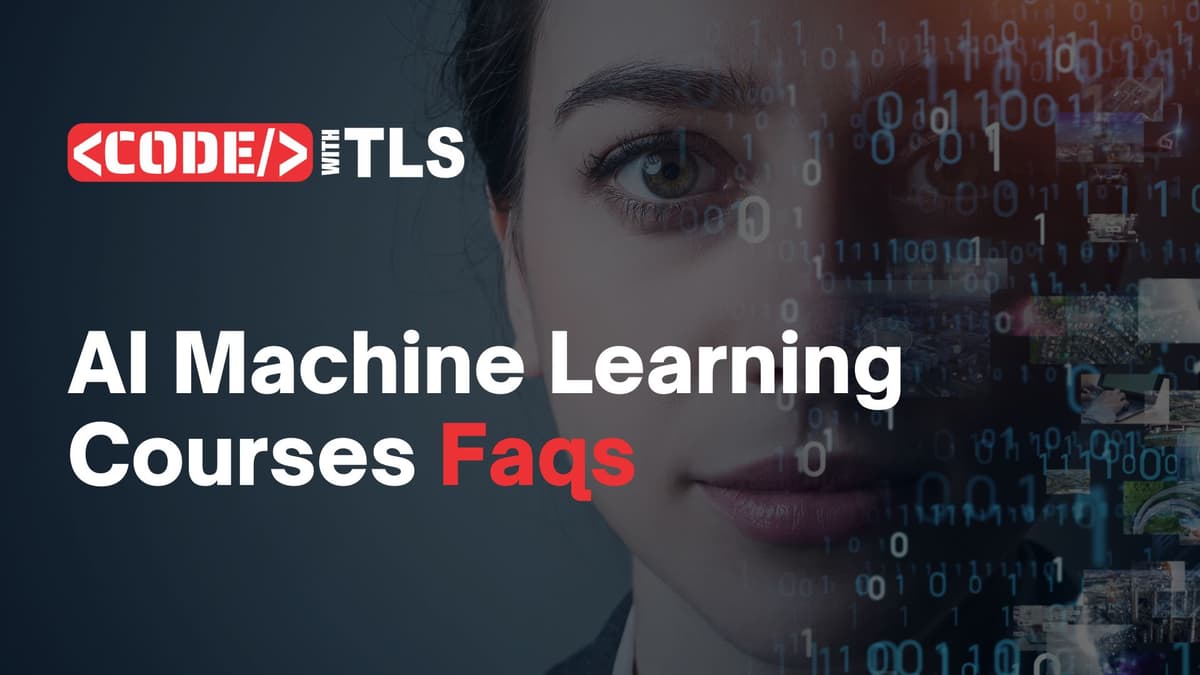

AI and Machine Learning Courses: FAQs
Published: 2024-12-06 13:25:52
AI and ML are changing the world, from healthcare to entertainment. With growing demand for skilled professionals, AI and ML courses are more popular than ever. If you're new to these fields, you might have many questions. Don't worry! We’ve gathered answers to the most common FAQs about AI and ML courses, plus how Code with TLS - Leading Tech Course Provider can support your learning journey. Whether you're a student or a professional, this guide will help you get started.
However, for many, diving into the world of AI and ML can seem daunting, and numerous questions may arise about the nature of these courses. To help demystify the process, we’ve compiled answers to some of the most frequently asked questions (FAQs) about AI and Machine Learning courses, along with how Code With TLS (The Learning Station) can support you on this exciting educational journey. Here are few FAQs
Contact us for free guidance and Boot Camp details.
Top AI and Machine Learning Courses FAQ
1. What is the Duration of AI/ML Courses?
The duration of AI and ML courses can vary significantly based on the type of program you choose and the level of depth you wish to explore.
Short-Term Courses:
These are typically aimed at professionals looking to upskill or those wanting to gain a foundational understanding of AI and ML. These courses can range from 4 to 12 weeks and are often offered by platforms like Coursera, edX, or bootcamps. They cover fundamental concepts, practical applications, and specific tools such as TensorFlow, Python, and scikit-learn.
Degree Programs (B.Tech, M.Tech):
For those pursuing undergraduate or postgraduate degrees in AI or ML, the duration is much longer. A B.Tech in Computer Science with a specialization in AI typically takes 4 years, while a Master’s (M.Tech) program in AI/ML usually spans 2 years. These programs offer an in-depth study of algorithms, neural networks, machine learning, deep learning, natural language processing, and more.
Ph.D. Programs:
If you're considering research and a career in academia or highly specialized roles, a Ph.D. in AI/ML can take 3 to 5 years, depending on your research focus and institution.
In summary, the duration of AI/ML courses varies depending on your educational goals—from a few weeks for certifications to several years for degree programs.
Read More:
Big Data Analytics in Data Science
Can I Learn Coding After 10th?
Career Opportunities and Salaries for MERN Stack
Cubit vs GetX: Flutter State Management & Dependency Injection
Data Science Course Duration and Fees 2025
2. What Skills Do I Need to Start?
AI and ML are highly technical fields that require a solid foundation in several key areas. While it is not mandatory to have a background in computer science, certain skills will significantly improve your chances of success in an AI/ML course:
1. Mathematics & Statistics:
Linear Algebra: Used extensively in algorithms for deep learning.
Calculus: Critical for understanding optimization techniques.
Probability & Statistics: Core to understanding algorithms and model evaluation.
2. Programming:
Python: The most widely used programming language in AI/ML, thanks to its simplicity and powerful libraries such as NumPy, pandas, scikit-learn, and TensorFlow.
R: Often used for statistical computing and data analysis.
C or Java: These languages are also used in certain AI applications but are less common for beginners.
3. Data Handling:
AI/ML involves working with large datasets, so knowledge of data manipulation, data wrangling, and database management is essential. Proficiency in SQL and understanding tools like Hadoop or Spark is a bonus.
4. Algorithms & Data Structures:
Understanding the basics of algorithms, sorting techniques, and data structures is crucial for implementing AI models efficiently.
5. Machine Learning Libraries:
Familiarity with libraries like TensorFlow, Keras, PyTorch, and scikit-learn will be extremely helpful for building AI/ML models.
While these skills form the foundation, many AI/ML courses begin with an introduction to these concepts, making it possible for those with a basic understanding of programming to get started.
3. Are AI/ML Courses Worth the Investment?
The short answer is: Yes, AI and ML courses are worth the investment. Here’s why:
1. Growing Demand for AI/ML Professionals:
As industries continue to adopt AI technologies, the demand for professionals in AI and ML is surging. According to LinkedIn’s 2020 Emerging Jobs Report, AI Specialist and Machine Learning Engineer were among the top 10 emerging job roles in India. The global demand for AI talent is growing, and with it, salaries are becoming increasingly competitive.
2. High Return on Investment (ROI):
AI and ML roles offer some of the highest salaries in the tech industry. According to Payscale, the average salary for an AI/ML engineer in India ranges from INR 6 to 25 LPA, with experienced professionals earning considerably higher. Considering the job market’s growing demand, AI/ML courses provide a high ROI compared to many other fields.
Read More:
Data Science Projects for Beginners
Data Science vs Machine Learning
Digital Marketing Course Details
Digital Marketing Courses: Free & Paid
3. Cross-Industry Applications:
AI and ML are not confined to tech companies alone. From healthcare and finance to automotive and entertainment, AI has become indispensable across all sectors. This diversity opens up numerous career opportunities and ensures that your skills will remain in demand for years to come.
4. Career Advancement:
For those already working in tech or related fields, AI/ML courses allow for career advancement by enabling professionals to move into higher-paying, more technically challenging roles. For example, a data analyst can transition into a data scientist role, and a software engineer can upskill to become an AI engineer.
4. Online vs. Offline: Which is Better?
When deciding between online and offline AI/ML courses, each format offers distinct advantages. Here’s a breakdown:
Online Courses:
Flexibility: Online courses allow you to learn at your own pace and on your own schedule. This is ideal for working professionals or those who need to balance study with other commitments.
Global Access: Online courses are typically offered by renowned universities and platforms such as Coursera, Udemy, or edX, allowing you to access the best resources regardless of your location.
Affordability: Online courses tend to be more affordable than offline programs, with many offering free trials or low-cost certification options.
Offline (Classroom-Based) Courses:
In-Person Interaction: Offline courses provide the opportunity to engage directly with instructors and peers, which can be beneficial for deeper understanding and networking.
Structured Learning Environment: If you prefer a more traditional learning environment with fixed timelines and access to on-campus resources (labs, libraries, etc.), offline courses may be better suited for you.
Hands-On Projects: Many offline programs offer more direct, hands-on learning through workshops, hackathons, and lab exercises.
In conclusion, the choice between online and offline depends on your learning style, career goals, and schedule. Online courses offer flexibility, while offline programs provide a more immersive, traditional educational experience.
Read more:
Digital Marketing Institute Delhi Job Guarantee
Digital Marketing Institute Online Courses
Digital Marketing Salary in India
5. Career Prospects After Completing an AI/ML Course
Completing an AI/ML course opens up a wealth of career opportunities. The skills acquired through AI/ML training are in high demand across various sectors:
1. AI/ML Developer:
Develop machine learning algorithms and models for applications across multiple industries, including healthcare, finance, and e-commerce.
2. Data Scientist:
Analyze complex datasets, create predictive models, and derive actionable insights for business strategies.
3. NLP Engineer:
Specialize in building AI applications related to language, such as chatbots, voice assistants, and text analytics.
4. AI Researcher:
Engage in high-level research to push the boundaries of AI/ML, contributing to new methodologies and breakthroughs.
5. Robotics Engineer:
Apply AI/ML to robotics, building autonomous systems for industries like manufacturing, logistics, and healthcare.
With the rise of AI in various sectors, the future job market is filled with promising opportunities for AI/ML professionals.
Explore More: Top AI ML Jobs In India
AI ML Course Syllabus
How Code With TLS Can Help You with Your AI/ML Career
Navigating the world of AI/ML education can be overwhelming, but Code With TLS (The Learning Station) is here to guide you through the process. Here’s how Code With TLS can assist:
1. Personalized Guidance:
Code With TLS helps you identify the right course based on your career goals and educational background. Whether you're looking for foundational knowledge or advanced specialization, Code With TLS offers tailored advice.
2. Expert Training:
Code with TLS partners with top educational institutions and platforms to offer the latest AI/ML courses, ensuring you receive high-quality, up-to-date training from industry experts.
3. Placement Assistance:
Code With TLS has strong ties with leading tech companies and provides placement support, helping you secure internships and full-time roles in AI/ML.
4. Career Development:
In addition to training, Code With TLS offers career coaching, resume building, and interview preparation to help you land the job of your dreams in AI/ML.
Conclusion
AI and Machine Learning are fields brimming with potential, offering rewarding career opportunities for those equipped with the right skills. Whether you're considering short-term certifications or degree programs, understanding your goals and preparing yourself with the necessary skills is crucial. With the right training and support, such as the services offered by Code With TLS, you can embark on a successful career in AI/ML and contribute to shaping the future of technology.


